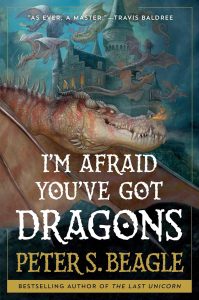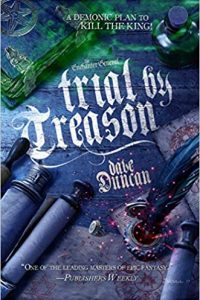Gary K. Wolfe Reviews I’m Afraid You’ve Got Dragons by Peter S. Beagle
 I’m Afraid You’ve Got Dragons, Peter S. Beagle (Saga 978-1-6680-2527-7, $26.00, 280pp, hc) May 2024.
I’m Afraid You’ve Got Dragons, Peter S. Beagle (Saga 978-1-6680-2527-7, $26.00, 280pp, hc) May 2024.
For an author who once seemed an icon of the 1960s, Peter S. Beagle is quite a survivor. While on the one hand he’s revisited the beloved worlds of The Innkeeper’s Song and The Last Unicorn (most recently with last year’s The Way Home), he also has produced a series of extraordinarily graceful (and occasionally very funny) autobiographical stories, contemporary fantasy novels (Summerlong), unicorn stories that have nothing to do with his classic (such as In Calabria), and a wealth of stories that display his characteristic gentleness, grace, and wit, including a very funny dragon story called ‘‘Oakland Dragon Blues’’, which was included in last year’s The Essential Peter S. Beagle. But, as it turns out, the dragon novel that Beagle’s fans have long been waiting for is I’m Afraid You’ve Got Dragons, which isn’t quite as remorselessly whimsical as that title suggests (it takes a surprisingly dark turn partway in) but which is nonetheless a delight. That long wait is no joke, by the way; the novel was originally announced in 2007. I have no idea if Beagle has reworked it since then, but it hardly makes any difference: this is easily Beagle’s most substantial novel since Tamsin a quarter century ago.
As is often the case with Beagle, most of the main characters in I’m Afraid You’ve Got Dragons are pretty dissatisfied with the roles they’ve been assigned in life, and those roles initially look pretty familiar: a working-class kid who makes a living as a dragon exterminator, a handsome prince from a remote kingdom, his loyal valet (who in good Wodehousian tradition is way sharper than the prince), the independent-minded princess who is betrothed to him, a secondary pair of assistants who eventually make a cute couple of their own, and, later on, a pretty cranky evil wizard. The dragon exterminator, whose name is Gaius Aurelius Constantine Heliogabalus Thrax, but who quite reasonably prefers to be called Robert, hates the job he inherited from his late father, which consists mostly of clearing royal residences of tiny gecko-sized dragons, which he then trades or sells on the local dragon market. But Robert is actually quite fond of the dragons, with which he feels an odd affinity, and he keeps several in his own home. He first meets Princess Cerise, who has been interviewing a series of suitors, when her family hires him to de-dragonize their rather modest palace before a visit from the absurdly handsome (if a bit feckless) Prince Reginald, from a far more prosperous neighboring kingdom. Reginald (who, like both Robert and Cerise, has parent issues) decides that he can’t honestly be worthy of Cerise’s hand unless he achieves some sort of heroic status by slaying a dragon. Since he has no idea how to even find one, Robert gets drafted into the quest, and Cerise insists on coming along as well. Soon it nearly becomes a parade.
So far, the novel reads much like the sort of lighthearted fantasy-parody that almost earns the comparison with The Princess Bride in some of the promo materials, but not far into their quest, the doughty trio comes across a village so thoroughly annihilated that Robert suspects dragons far more powerful than any he has ever seen, prompting him to worry about the return of the legendary King Dragons who haven’t been seen in generations. Adding to the mystery is an elderly figure who seems to show up wherever their quest takes them, even though he could only have travelled so far so quickly through magical means. It’s something of a tribute to Beagle’s skillful manipulation of tone that he manages to briefly turn a lighthearted fantasy into a horror story, and then shift it back again as we meet a powerful wizard named Dahr, who is part loquacious Bond villain (he loves to explain his schemes to the point of tedium), part Saruman, and part plot point (he’s essential to Robert discovering his true nature.) The result is a novel that is as much fun as its title suggests, but with the darker nuances that have always given Beagle’s fiction an unexpected gravitas, and a depth of character that – again a Beagle trademark – manages to turn archetypes into living, breathing figures.
Gary K. Wolfe is Emeritus Professor of Humanities at Roosevelt University and a reviewer for Locus magazine since 1991. His reviews have been collected in Soundings (BSFA Award 2006; Hugo nominee), Bearings (Hugo nominee 2011), and Sightings (2011), and his Evaporating Genres: Essays on Fantastic Literature (Wesleyan) received the Locus Award in 2012. Earlier books include The Known and the Unknown: The Iconography of Science Fiction (Eaton Award, 1981), Harlan Ellison: The Edge of Forever (with Ellen Weil, 2002), and David Lindsay (1982). For the Library of America, he edited American Science Fiction: Nine Classic Novels of the 1950s in 2012, and a similar set for the 1960s. He has received the Pilgrim Award from the Science Fiction Research Association, the Distinguished Scholarship Award from the International Association for the Fantastic in the Arts, and a Special World Fantasy Award for criticism. His 24-lecture series How Great Science Fiction Works appeared from The Great Courses in 2016. He has received six Hugo nominations, two for his reviews collections and four for The Coode Street Podcast, which he has co-hosted with Jonathan Strahan for more than 300 episodes. He lives in Chicago.
This review and more like it in the May 2024 issue of Locus.
 While you are here, please take a moment to support Locus with a one-time or recurring donation. We rely on reader donations to keep the magazine and site going, and would like to keep the site paywall free, but WE NEED YOUR FINANCIAL SUPPORT to continue quality coverage of the science fiction and fantasy field.
While you are here, please take a moment to support Locus with a one-time or recurring donation. We rely on reader donations to keep the magazine and site going, and would like to keep the site paywall free, but WE NEED YOUR FINANCIAL SUPPORT to continue quality coverage of the science fiction and fantasy field.
©Locus Magazine. Copyrighted material may not be republished without permission of LSFF.






